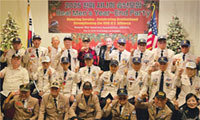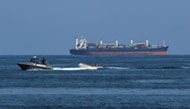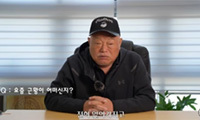If the conflict in Georgia were an Olympic event, the gold medal for brutish stupidity would go to the Russian prime minister, Vladimir Putin. The silver medal for bone-headed recklessness would go to Georgia’s president, Mikheil Saakashvili, and the bronze medal for rank short-sightedness would go to the Clinton and Bush foreign policy teams.
Let’s start with the United States. After the collapse of the Soviet Union, I was among the group - led by George Kennan, the father of “containment” theory, Senator Sam Nunn and the foreign policy expert Michael Mandelbaum - that argued against expanding NATO, at that time.
It seemed to us that since we had finally brought down Soviet communism and seen the birth of democracy in Russia the most important thing to do was to help Russian democracy take root and integrate Russia into Europe. Wasn’t that why we fought the cold war - to give young Russians the same chance at freedom and integration with the West as young Czechs, Georgians and Poles- Wasn’t consolidating a democratic Russia more important than bringing the Czech Navy into NATO?
All of this was especially true because, we argued, there was no big problem on the world stage that we could effectively address without Russia - particularly Iran or Iraq. Russia wasn’t about to reinvade Europe. And the Eastern Europeans would be integrated into the West via membership in the European Union.
No, said the Clinton foreign policy team, we’re going to cram NATO expansion down the Russians’ throats, because Moscow is weak and, by the way, they’ll get used to it. Message to Russians: We expect you to behave like Western democrats, but we’re going to treat you like you’re still the Soviet Union. The cold war is over for you, but not for us.
“The Clinton and Bush foreign policy teams acted on the basis of two false premises,” said Mandelbaum. “One was that Russia is innately aggressive and that the end of the cold war could not possibly change this, so we had to expand our military alliance up to its borders. Despite all the pious blather about using NATO to promote democracy, the belief in Russia’s eternal aggressiveness is the only basis on which NATO expansion ever made sense - especially when you consider that the Russians were told they could not join. The other premise was that Russia would always be too weak to endanger any new NATO members, so we would never have to commit troops to defend them. It would cost us nothing. They were wrong on both counts.”
The humiliation that NATO expansion bred in Russia was critical in fueling Putin’s rise after Boris Yeltsin moved on. And America’s addiction to oil helped push up energy prices to a level that gave Putin the power to act on that humiliation. This is crucial backdrop.
Nevertheless, today we must support all diplomatic efforts to roll back the Russian invasion of Georgia. Georgia is a nascent free-market democracy, and we can’t just watch it get crushed. But we also can’t refrain from noting that Saakashvili’s decision to push his troops into Tskhinvali, the heart of Georgia’s semiautonomous pro-Russian enclave of South Ossetia, gave Putin an easy excuse to exercise his iron fist.
As The Economist magazine wrote, “Saakashvili is an impetuous nationalist.” His thrust into South Ossetia “was foolish and possibly criminal. But unlike Putin, he has led his country in a broadly democratic direction, curbed corruption and presided over rapid economic growth that has not relied, as Russia’s mostly does, on high oil and gas prices.”
That is why the gold medal for brutishness goes to Putin. Yes, NATO expansion was foolish. Putin exploited it to choke Russian democracy. But now, petropower- grabbing has gone to his head - whether it’s invading Georgia, bullying Western financiers and oil companies working in Russia, or using Russia’s gas supplies to intimidate its neighbors.
If it persists, this behavior will push every Russian neighbor to seek protection from Moscow and will push the Europeans to redouble their efforts to find alternatives to Russian oil and gas.
This won’t happen overnight, but in time it will stretch Russia’s defenses and lead it to become more isolated, more insecure and less wealthy.
For all these reasons, Russia would be wise to reconsider Putin’s Georgia gambit. If it does, we would be wise to reconsider where our NATO/Russia policy is taking us - and whether we really want to spend the 21st century containing Russia the same way we spent much of the 20th containing the Soviet Union.
스마터리빙
more [ 건강]
[ 건강]이제 혈관 건강도 챙기자!
[현대해운]우리 눈에 보이지 않기 때문에 혈관 건강을 챙기는 것은 결코 쉽지 않은데요. 여러분은 혈관 건강을 유지하기 위해 어떤 노력을 하시나요?
 [ 건강]
[ 건강]내 몸이 건강해지는 과일궁합
 [ 라이프]
[ 라이프]벌레야 물럿거라! 천연 해충제 만들기
 [ 건강]
[ 건강]혈압 낮추는데 좋은 식품
[현대해운]혈관 건강은 주로 노화가 진행되면서 지켜야 할 문제라고 인식되어 왔습니다. 최근 생활 패턴과 식생활의 변화로 혈관의 노화 진행이 빨라지고
사람·사람들
more
‘러브인뮤직’ 2025 성탄 음악회 성료
러브인뮤직은 지난 20일 LA 동양선교교회(담임 김지훈 목사)에서 가진 2025 성탄 작은 음악회를 끝으로 각 지역 봉사처별 올해 활동을 마무…

한인 향군 단체들 ‘진짜사나이’ 송년 행사
6·25 참전유공자회(회장 이재학)와 육군협회(회장 최만규)가 공동 주최한 2025 ‘진짜사나이’ 송년모임이 지난 19일 LA 용궁식당에서 한…
“취미생활로 다진 친목… 선후배들과 만든 모교사랑…
사진러브한인 사진 동호회 사진러브(회장 크리스 고)는 13일 용수산에서 송년모임을 갖고 한 해를 마무리하는 뜻깊은 시간을 가졌다. 이날 모임에…
[홀인원] 이상원 박사
일반외과 전문의 이상원(왼쪽) 박사가 지난 9일 뉴포트비치 소재 골프장 9번 홀(152야드)에서 레스큐 클럽으로 친 샷이 그대로 홀에 빨려 들…
[송년행사 게시판] 재미시인협회
재미시인협회(회장 지성심)는 오는 20일 오후 4시 가든스윗호텔에서 한 해를 마무리하며 동인지 ‘외지’ 제35집 출판 기념회와 ‘제23회 재미…
많이 본 기사
- 연말 ‘로드레이지’ 비극… 한인 총격 피살
- ICE 홈디포 급습단속에 한인 체포 2
- 성탄 연휴 폭우 ‘비상’ 주중 최대 6인치 온다
- ‘거액 탈세·통관 사기’ 한인 통관브로커 중형
- 트럼프, 건강보험사들에 “보험료 내려… 1
- ‘SNS 검증’에 비자심사 적체… “최대 12개월 지연”
- 2026년을 기다리며… 타임스퀘어 벌써 새해맞이 분위기
- 17년차에 17개 수상으로 증명했다..국민 여동생, 국민 가수, ‘국민 배우’까지 ‘아이유 천하’
- 말살되고 있는 유럽의 성탄절 전통, … 1
- ‘재미 이산가족 상봉 지원법’ 트럼프 서명
- ‘정치 손절’ 김흥국 “내년 선거 때 연락하지마..아들·딸 보기 부끄러워”
- 엡스타인 파일 공개했지만… 트럼프 사진 하루 만에 삭제
- 관세로 준다던 미군 보너스 알고보니 ‘주택보조금’ 예산
- 파워볼 로토 열풍 지속 오늘 잭팟 16억 달러로
- 한인 최초 NASA 우주비행사 조니 김… “우주서 김치·밥 그리웠다”
- 냉장고 문짝 1초 만에 조립… ‘다크 팩토리’ 성큼
- 외로운 이웃들
- 방탄소년단 정국, 또 자택 침입 피해로 몸살..50대 日 여성 경찰 입건
- 연준, 올해 세 번째 금리 인하… 내 지갑엔 어떤 변화?
- 아픔 딛고 첫 대상후보.. ‘말자’ 김영희 “X밭 걷고 있다 생각했는데..”
- “한인 세대간 갈등 극복 이렇게”… 회복 포럼
- 미 자동차 업계… 전기차 접고 내연차로 회귀
- 오늘 동지… 한인타운서 동지팥죽 함께 나누기 행사
- 대만서 ‘외로운 늑대’ 흉기 난동… 15명 사상
- [지평선] 쿠팡의 “한국말 몰라요”
- 시니어센터 ‘추첨제’로 29일 새학기 수강접수
- ‘탄소배출권 수익’으로 서민주택 대거 공급
- 사우디 ‘술 판매’ 실험 고소득 외국인에 허용
- [조지 F. 윌 칼럼] MIT에 대한 트럼프의 무분별한 공격
- 에어프레미아 9호기 도입 중·장거리 노선에 투입
- ‘소명’이라 알아듣고
- 고등학교 성적 인플레… SAT 점수 중요성 다시 부각
- ‘최강’ 안세영, 왕중왕전서 시즌 11승… 최다승 타이로 피날레
- 송성문, MLB 샌디에고행… 이정후·김혜성과 ‘히어로즈 더비’
- ‘1세대 연극 스타’ 윤석화 뇌종양 투병 69세로 별세
- ‘트럼프 SNS’ 모회사, 합병 발표
- 고물가에 연말 샤핑 ‘실속형’… 양말·커피·기저귀 선물
- “태형아! 사랑해♥” 방탄소년단 뷔 韓팬들 성수동 대형 조형물→한강 선착장 5곳 생일 축하 초특급서포트
- 국토장관 “영주권 추첨제도 전격 중단”
- 특검, ‘김건희 집사’ 김예성에 징역 8년 구형… “죄질 불량”
- 가족 이민 2개월째 전면 동결
- 간단한 혈액검사로 알츠하이머를 예측할 수 있을까
- 수주 물량 최소 750억달러… 미국 원전 특수 열린다
- “올해 미국서 AI 사유로 일자리 5… 1
- 이정후, MLB닷컴 선정 ‘2025 세계 올스타’
- “금리 인하 여지 충분” 백악관, ‘빅컷’ 재강조
- “재외선거 우편투표 본격 추진”
- WINTER HOLIDAYS, 2025
- 중국 틱톡, 미 합작사 설립 합의
- [이민법 칼럼] 이민법 221(g)에 따른 비자 거부
1/5지식톡

-
 ☝️해외에서도 가능한 한국어 선생님…
0
☝️해외에서도 가능한 한국어 선생님…
0이 영상 하나면 충분합니다!♥️상담신청문의♥️☝️ 문의 폭주로 '선착순 상담'만 진행합니다.☎️ : 02-6213-9094✨카카오톡ID : @GOODEDU77 (@골뱅이 꼭 붙여주셔야합니다…
-
 테슬라 자동차 시트커버 장착
0
테슬라 자동차 시트커버 장착
0테슬라 시트커버, 사놓고 아직 못 씌우셨죠?장착이 생각보다 쉽지 않습니다.20년 경력 전문가에게 맡기세요 — 깔끔하고 딱 맞게 장착해드립니다!장착비용:앞좌석: $40뒷좌석: $60앞·뒷좌석 …
-
 식당용 부탄가스
0
식당용 부탄가스
0식당용 부탄가스 홀세일 합니다 로스앤젤레스 다운타운 픽업 가능 안녕 하세요?강아지 & 고양이 모든 애완동물 / 반려동물 식품 & 모든 애완동물/반려동물 관련 제품들 전문적으로 홀세일/취급하는 회사 입니다 100% …
-
 ACSL 국제 컴퓨터 과학 대회, …
0
ACSL 국제 컴퓨터 과학 대회, …
0웹사이트 : www.eduspot.co.kr 카카오톡 상담하기 : https://pf.kakao.com/_BEQWxb블로그 : https://blog.naver.com/eduspotmain안녕하세요, 에듀스팟입니다…
-
 바디프렌드 안마의자 창고 리퍼브 세…
0
바디프렌드 안마의자 창고 리퍼브 세…
0거의 새제품급 리퍼브 안마의자 대방출 한다고 합니다!8월 23일(토)…24일(일) 단 이틀!특가 판매가Famille: $500 ~ $1,000Falcon: $1,500 ~ $2,500픽업 & 배송직접 픽업 가능LA…
케이타운 1번가
오피니언
 옥세철 논설위원
옥세철 논설위원말살되고 있는 유럽의 성탄절 전통, 그 원인은…

외로운 이웃들
 조지 F·윌 워싱턴포스트 칼럼니스트
조지 F·윌 워싱턴포스트 칼럼니스트 [조지 F. 윌 칼럼] MIT에 대한 트럼프의 무분별한 공격
 전지은 수필가
전지은 수필가 ‘소명’이라 알아듣고
 최문선 / 한국일보 논설위원
최문선 / 한국일보 논설위원[지평선] 쿠팡의 “한국말 몰라요”

잇단 총격·테러 음모… 한인타운 안전 우려

2025년, 성찰과 감사의 마무리를
 김인자 시인ㆍ수필가
김인자 시인ㆍ수필가 [금요단상] AI와 동거, 그 실체
 한영일 / 서울경제 논설위원
한영일 / 서울경제 논설위원[만화경] 웰다잉 인센티브
1/3지사별 뉴스

퀸즈장로교회 ‘사랑의 바구니’130개 이웃에 전달
퀸즈장로교회가 18일 크리스마스를 앞두고 교인들의 정성과 사랑이 듬뿍 담긴 ‘사랑의 바구니’ 130개를 소방서와 경찰서, 요양원, 선교회, 그…
시민권 박탈 착수⋯매달 200명

“이웃 돌보는 여러분이 동역자”
워싱턴성광교회(담임목사 임용우)는 18일 한인단체와 소방서‧도서관 등에 총 2만9천 달러의 성금을 전달했다. 지난 2011년부터 15년째 지역…
소기업 지원에 1천만 달러 투자

백악관 “인플레, 목표치보다 낮아…금리 더 일찍 내렸어야”
케빈 해싯 백악관 국가경제위원회(NEC) 위원장은 21일 중앙은행인 연방준비제도(Fed·연준)가 “금리를 더 일찍 내렸어야 했다”고 말했다.해…
엡스타인 파일 공개 다음날 트럼프 사진 삭제…야당서 탄핵 경고

오늘 하루 이 창 열지 않음 닫기 



















































.png)


댓글 안에 당신의 성숙함도 담아 주세요.
'오늘의 한마디'는 기사에 대하여 자신의 생각을 말하고 남의 생각을 들으며 서로 다양한 의견을 나누는 공간입니다. 그러나 간혹 불건전한 내용을 올리시는 분들이 계셔서 건전한 인터넷문화 정착을 위해 아래와 같은 운영원칙을 적용합니다.
자체 모니터링을 통해 아래에 해당하는 내용이 포함된 댓글이 발견되면 예고없이 삭제 조치를 하겠습니다.
불건전한 댓글을 올리거나, 이름에 비속어 및 상대방의 불쾌감을 주는 단어를 사용, 유명인 또는 특정 일반인을 사칭하는 경우 이용에 대한 차단 제재를 받을 수 있습니다. 차단될 경우, 일주일간 댓글을 달수 없게 됩니다.
명예훼손, 개인정보 유출, 욕설 등 법률에 위반되는 댓글은 관계 법령에 의거 민형사상 처벌을 받을 수 있으니 이용에 주의를 부탁드립니다.
Close
x